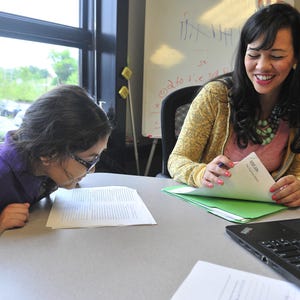Rocketship charter schools criticized as overly rigid

SAN JOSE, Calif. – Looking for first-graders at Fuerza Community Prep?
One sunny morning last spring, they could be spotted inside the school's spacious computer lab, headphones strapped on their ears, eyes scrutinizing mini-laptop screens, plowing through online books about Paul Bunyan and Johnny Appleseed and practicing online math exercises. This is where they spend up to 90 minutes a day.
For Preston Smith, a co-founder of Rocketship Education, the San Jose-based charter network that runs the school, that computer lab exemplifies what the chain is good at: harnessing technology to teach at-risk students.
"We feel a great responsibility to get our kids, who are often behind, up to grade level," said Smith, who oversees 11 tech-heavy elementary schools, including one in Nashville and one in Milwaukee. "I'm proud of that."
But for some former teachers and parents, the Rocketship computer lab tells a different story — of a charter network too reliant on "screen time," too light on free play and too obsessed with test scores.
Kate Mehr, a former Rocketship executive who now runs the Baltimore outpost of another charter network, says Rocketship's "stripped-down efficiency model" has much going for it. But, she says, "The question is, how efficient should you be when you're dealing with little human beings?"
Rocketship is perhaps the nation's most celebrated pioneer of online learning, having received millions of dollars from outside funders, including the Bill and Melinda Gates Foundation and the Obama administration, as well as financing from former tennis star Andre Agassi's real estate fund. The attraction is its innovative approach, which promises that intensive online work and a rigorous curriculum will help disadvantaged children make up ground quickly and gain parity with their better-off peers. (Close to 88 percent of the schools' students qualify for free or reduced-price lunch, and 60.5 percent are English-language learners.)
But as the network has grown, it has encountered challenges, losing key staff members and struggling with its reading program. In math, a relatively high percentage of its students routinely score well on state exams. But in 2013 — the last year thatCalifornia published reading and math scores — four of Rocketship's elementary schools showed significant dips in state reading scores.
"They are really phenomenal at marketing their schools," said Roxana Marachi, an associate professor in the Connie L. Lurie College of Education at San Jose State Rocketship charter schools criticized as overly rigid:

